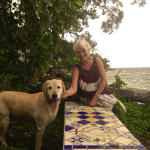 Thanks to DAI member Wendy Sanchez for her interesting article on her positive experiences with CogSmart, which "stands for Cognitive Symptom Management and Rehabilitation Therapy, a form of cognitive training to help people improve their skills in prospective memory (remembering to do things), attention, learning/memory, and executive functioning (problem-solving, planning, organization, and cognitive flexibility)." As we continue our daily blog series for World Alzheimer's Month 2016 #WAM2016 #DAM2016, we hope you are finding are mix of personal stories and other topics interesting.
Thanks to DAI member Wendy Sanchez for her interesting article on her positive experiences with CogSmart, which "stands for Cognitive Symptom Management and Rehabilitation Therapy, a form of cognitive training to help people improve their skills in prospective memory (remembering to do things), attention, learning/memory, and executive functioning (problem-solving, planning, organization, and cognitive flexibility)." As we continue our daily blog series for World Alzheimer's Month 2016 #WAM2016 #DAM2016, we hope you are finding are mix of personal stories and other topics interesting.
Wendy's experience of CogSmart...
"A year before a PET scan confirmed I had FTD, I suspected as much due to my episodic symptoms, (behavioral changes, speech problems, lack of balance, memory loss, confusion).
I had seen patients with advanced FTD in my 35 years of work as an RN.
My HMO offered little to no resources to address my concerns. Frustration pushed me to Dr. Google.com. That led me to DAI, an international non-profit peer-to-peer network, actively advocating for human rights for people with dementia. I learned about neuroplasticity and gained the strength/courage to self-advocate.
By my own request I was able to choose a different neurologist and get a PET scan. The new neurologist is young, charismatic, funny, patient, brilliant, and specializes in FTD. He is also a link between the HMO and University of California San Francisco ongoing FTD research.
During the earlier months after diagnosis, I often wished I could access the same rehab programs provided to patients with head trauma or spinal injuries. People with dementia weren’t even eligible for disability (currently at the top of DAI’s advocacy issues/actions - internationally).
Again, through my new self advocacy, I discovered that my new neurologist and his speech pathologist colleague were facilitating a 5 week course through the HMO, open to anyone, called “COGSMART”.
Although most attendees were undiagnosed, we shared a passionate interest in brain health (from the perspective of sub-optimal brain function).
My family care person accompanied me and provided the transportation as we gathered tools for the future together.
The group was set up in an interactive, informal setting - from the get-go. my Neuro MD’s presence dispelled my fears about sharing, we sat in a circle at tables, used a large print syllabus to keep us on track, name tags - we were people not patients. And we were encouraged to ask questions, comment, tell pertinent stories. Each week focused on a different topic and introduced a guest speaker knowledgeable about current research relating to Brain Aging:
Topics included Physical Exercise, End of Life Planning, Sleep Apnea, Depression & other emotional, psychological issues, Nutrition, Meditation, surrendering the driver’s license, Tips for organizing - calendar, keys, self talk, removal of clutter, planning, etc.
Thanks to the suggestions and group support, I began to make small changes in my daily routine. I can notice improvement in all areas whereas previously I would have not even tried to learn or implement new ways.
The “old me” would have said “oh how boring, spontaneity is more fun”. The “new me” realizes that the old ways are no longer an option I want to entertain. The tools give me back an important sense of having some control - vis a vis choices."
By DAI member, Wendy Sanchez